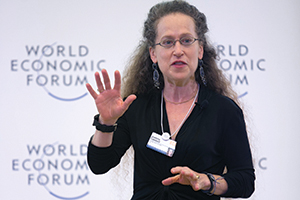SCS Faculty Discuss Integrated Intelligence in Davos, Switzerland In Pittsburgh, Blum Is Panelist for "Shaping Davos" Event
Byron SpiceFriday, January 16, 2015Print this page.

School of Computer Science faculty members, led by President Subra Suresh, will lead a discussion on integrated intelligence at the World Economic Forum's annual meeting in Davos, Switzerland, Jan. 21–24.
Justine Cassell, Illah Nourbakhsh, Tony Stentz and Red Whittaker will make presentations at the CMU IdeasLab during the meeting. The WEF is the world's foremost international organization committed to improving the state of the world by engaging business, political and academic leaders, and other members of society to shape global, regional and industrial agendas.
In Pittsburgh on Jan. 20, Computer Science Professor Lenore Blum will be a panelist at the first-ever Shaping Davos event, part of a global dialogue of 40 cities held in conjunction with the Davos meeting. Pittsburgh was selected by the WEF as the only North American city to share its story of innovation. Blum, co-director of the Center for Innovation and Entrepreneurship and director of SCS's Project Olympus, will discuss how innovation is reshaping Pittsburgh's economy.
Shaping Davos, presented by Pittsburgh's Global Shapers Hub, will take place from 9 a.m. to 1 p.m., Tuesday, Jan. 20, at the Energy Innovation Center, 1435 Bedford Ave. A panel on innovative ideas, from creators that include CMU engineering alumna and SolePower co-founder Hahna Alexander, will begin at 9 a.m. The panel on innovative actions, including both Blum and CMU Trustee Luke Skurman, begins at 10:30 a.m.
At the Davos meeting, the IdeasLab presentations include:
- Cassell, associate vice-provost for Technology Strategy and Impact and professor in the Human-Computer Interaction Institute discussing robots as friends and companions;
- Nourbakhsh, professor in the Robotics Institute and director of the CREATE Lab speaking about human empowerment and how robotic technologies can enhance and challenge society;
- Stentz, research professor at the Robotics Institute and director of the National Robotics Engineering Center, exploring robots in the workplace; and
- Whittaker, the Fredkin University Research Professor, director of CMU's Field Robotics Center and chairman and chief science officer at Astrobotic, discussing robotics in rescue environments.
"As we integrate technology into more aspects of society, we must ensure that we attend to the cultural, social, legal and economic implications — as well as the technical implications of those technologies," Cassell said. "In my own work, I pay attention to those aspects of being human that are most important to us: relationships with other people, interaction and a feel of rapport. I build technologies that highlight and preserve those aspects."
Faculty also are speaking or moderating during a number of other sessions:
- Whittaker — Extreme Robotics; Mining and Metals in a Sustainable World;
- Nourbakhsh — The Implications of Greater Human–Machine Interaction; and
- Cassell — Insights on Innovation and Industry; and the Promise and Peril of Exponential Technologies.
"By combining our strengths in sociology, design, machine learning, robotics and human-computer interaction, Carnegie Mellon is demonstrating how culture, big data and massive Internet connectivity can be forged into new tools that serve humanity," Nourbakhsh said.
Byron Spice | 412-268-9068 | bspice@cs.cmu.edu
